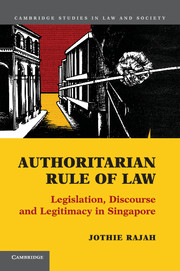Book contents
- Frontmatter
- Contents
- An Insider’s Preface on ‘Rule of Law’ Confusions
- Acknowledgements
- 1 Law, Illiberalism and the Singapore Case
- 2 Law as Discourse
- 3 Punishing Bodies, Securing the Nation
- 4 Policing the Press
- 5 Policing Lawyers, Constraining Citizenship
- 6 Policing Religion
- 7 Entrenching Illiberalism
- 8 Legislation, Illiberalism and Legitimacy
- Bibliography
- Index
7 - Entrenching Illiberalism
The 2009 Public Order Act
Published online by Cambridge University Press: 05 June 2012
- Frontmatter
- Contents
- An Insider’s Preface on ‘Rule of Law’ Confusions
- Acknowledgements
- 1 Law, Illiberalism and the Singapore Case
- 2 Law as Discourse
- 3 Punishing Bodies, Securing the Nation
- 4 Policing the Press
- 5 Policing Lawyers, Constraining Citizenship
- 6 Policing Religion
- 7 Entrenching Illiberalism
- 8 Legislation, Illiberalism and Legitimacy
- Bibliography
- Index
Summary
This book opened with a brief account of Lee Kuan Yew’s exchange with the IBA – an exchange in which he rehearsed the narratives of exceptionalism, described the duality of the legal system and insisted that Singapore was ‘rule of law’. The central role played by this lawyer-leader in the reformulation of the ‘rule of law’ into an increasingly entrenched ‘rule by law’ has been demonstrated throughout this project, perhaps most vividly by his conduct during the 1986 Select Committee Hearings on the Legal Profession Act. In 2011, with Lee eighty-eight years old, the question arises as to how much of Singapore’s strategic management of ‘law’ is dependent on Lee leading the state, whether as Prime Minister or behind the scenes as Senior Minister and Minister Mentor. In other words, can legitimacy for ‘rule by law’ continue to be sustained in a Singapore without Lee Kuan Yew? In a tentative explorative of this question, I thread through the chronological logic of the case studies examined in this study with a brief consideration of a new legislative instrument, the 2009 Public Order Act. This exploration addresses the question of the sustainability of ‘rule by law’ legitimacy in a Singapore that has been so dominated, for so long, by one man.
The Public Order Act arises from a context of public domain contestation. In this regard, it is ‘law’ within the same category as the four enactments I have studied. While a detailed analysis of the Public Order Act is not possible (because the Act was just two years in existence at the time of writing and in this sense had yet to be fully performed), it is instructive to consider the ways in which this (apparently) newly minted legislation rehearses the key strategies, narratives and ideologies evident in the Vandalism Act, the Press Act, the Legal Profession Act and the Religious Harmony Act. In other words, the story of the Public Order Act suggests that Singapore’s ‘rule by law’ has become an institutional feature of the Singapore state and does not require the personality and presence of Lee Kuan Yew to endure as a mode of legality.
- Type
- Chapter
- Information
- Authoritarian Rule of LawLegislation, Discourse and Legitimacy in Singapore, pp. 259 - 266Publisher: Cambridge University PressPrint publication year: 2012



